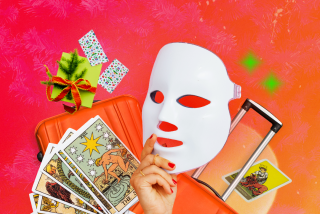When a gift is just a gift
- Share via
THE other day, when my energy was running low, I idly asked a friend at work: “Remember the days when patients and their families brought us lots of goodies? Where’s the box of chocolates when we really need it?”
He stared at me incredulously.
“Come on,” he said, in a tone that was only half kidding. “You know all gifts from patients are bribes.”
“What! Do you really believe that?” I asked, genuinely shocked. Meanwhile, I started to think about a present a patient had given me just the week before. He had no hidden motive. Or did he?
“Well, calling a gift a bribe depends on the context, I guess,” my friend conceded. “In some parts of the world, giving a gift may be the only way to get medical care.”
The patient who came to mind during this conversation is a gentle, middle-aged teacher who was born on another continent. Two years earlier, he had consulted me about a rare infection he developed following chemotherapy, and we had quickly become friends.
Within a few months, he was well enough to travel home to his native country. Sadly, his health then declined, and he was again in and out of the hospital.
One thing that this patient and I share is a fondness for a series of detective stories set in Africa. Recently, while chatting with him at his bedside, I learned he didn’t have the latest book. And so I bought him the paperback.
The next time I saw him in the hospital, to my surprise, he had something for me. In an ordinary grocery bag (for which he apologized profusely) was an exquisite, handmade basket with red, green and burgundy chevrons in its bowl and an intricate diamond pattern on its footed base.
My friend explained that 50 years earlier his mother had dyed the hemp and woven it herself. Astounded that he would honor me with such a precious keepsake, I asked him several times if I should take it before I finally said thanks.
The exchange of gifts between patients and doctors never came up in medical school. When I started my internship, however, our grizzled chief, Dr. Webster, offered this wise advice: Don’t take money, candy is dandy, and think hard about everything else.
In other words, be ethical and sensitive to appearances. Don’t exploit your power over people’s lives, and don’t let people exploit you.
I can still recall my hesitation in accepting my first true gift as a doctor -- a new-fangled, battery-powered watch. The giver was a wealthy businessman whose wife had been ravaged by a stroke.
Although there was little we could do for her, the patient’s husband always made sure his wife’s interns and residents were “appreciated.” He started by arranging deliveries of food from his downtown club. To his credit, he waited until his wife was being discharged to pass out the watches.
Since then, I have received from patients many boxes of candy and fruit, bottles of wine, music CDs, a few gift certificates. One of my all-time favorite gifts was a Betty Boop coffee mug. Even if these presents were strategic (which I find hard to believe), I could never have declined them -- it would have felt cold.
On the other hand, I draw the line when patients try to write me personal checks for causes they know I care about. I instead direct them to a nonprofit relief organization.
As for doctors giving gifts to patients, I credit several co-workers with teaching me that gifts can go both ways. One favorite mentor was a lifelong bird-watcher who occasionally bought feathered pets for elderly patients, then followed up with home visits and avian advice. Another doctor-friend gives books and videotapes to patients from a library she maintains at work expressly for this purpose.
I’m not naive. I know that certain “gifts” in medicine, as in life, come with strings attached. If you read enough newspapers, you are sure to find stories about a few patients and doctors who have struck unholy deals leading to such things as the special handling of an insurance claim, the prescribing of painkillers and a higher spot on a surgery waiting list. Major donors to medical centers may also expect special favors, although I’ve known plenty who wait their turn in a crowded office like everyone else.
Thinking back on my own life in medicine, however, none of this seems terribly relevant. Most gifts in medicine are generous, not self-seeking. And some, such as a warm smile or handshake, encouraging words or an unexpected joke or personal story shared between doctor and patient, can’t even be bought or wrapped in a bow.
Of course, I will always treasure my patient’s heirloom, but most of all I cherish his sweetness, patience and courage in the face of a rough battle. Such gifts of the heart are medicine’s greatest joy, known, I’m sure, to even the most jaded among us.
After years of dedicated practice, my more jaded colleague surely also knows the inspiration and joy of receiving such gifts.
Claire Panosian Dunavan is an infectious diseases specialist and professor of medicine at the David Geffen School of Medicine at UCLA.
More to Read
Sign up for our Book Club newsletter
Get the latest news, events and more from the Los Angeles Times Book Club, and help us get L.A. reading and talking.
You may occasionally receive promotional content from the Los Angeles Times.







